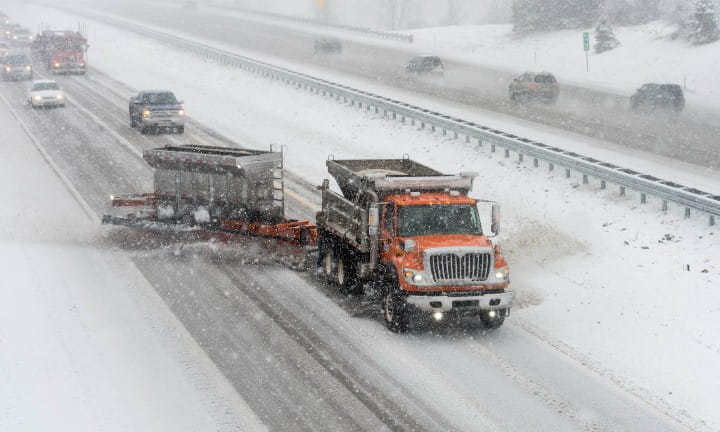
Department of Transportation
Snow plow at work clearing a highway.By KENZIE TERPSTRA
Capital News Service
LANSING – As the winter season approaches, counties across Michigan are preparing to handle the inevitable dumping of snow, especially on roadways.
Technology and processes employed have helped plows become more efficient, said Bradley Wieferich, the director of the Department of Transportation.
“There are so many different sensors and factors that (plow drivers) have to weigh in on their job,” Wieferich said.
He said plow operators are constantly looking at factors such as wind speed, relative humidity and temperature while clearing the roads.
In addition to technology, rock salt is a major contributor to keeping roads clear of snow and ice, according to Wieferich.
“Salt, at the end of the day, is what we have to melt snow and ice – it’s needed for safety,” Wieferich said.
However, the salt left on roads after snow and ice removal eventually washes into ditches or waterways, and the department is working to minimize the use of salt to protect the state’s watercourses, Wieferich said.
“We’re looking into some agricultural byproducts that might help lower the temperature at which salt is going to be effective, which would be a big benefit,” Wieferich said.
Jeff Cranson, the director of communications at MDOT, said the vast majority of state roads are plowed under contracts by cities and counties.
Craig Bryson, the senior communications director at the Road Commission of Oakland County, said the county is always looking at alternatives to salt.
“A lot of the agricultural byproducts like beet juice all have an odor to them,” Bryson said. “They also attract wildlife to the roads.”
Bryson said Oakland County, traditionally, has the highest number of car crashes involving deer – over 2,000 last year – and the use of these agricultural alternatives to salt may attract more deer to the roads, putting drivers at even greater risk.
The combination of rock salt and liquid brine, which contains naturally occurring saltwater, has been both the best-performing method of snow and ice removal and the most cost-effective, according to Bryson.
“We have three brine wells in the county, so we pump the brine out of the ground and it’s essentially free to us after the cost of building the wells,” Bryson said.
Bryson said the use of wing plows – which fold into the side of trucks and swing out for use – enable drivers to clear the width of the truck and an additional lane at the same time.
Jerry Byrne, the managing director of the Kent County Road Commission, said the agency blends different products to aid in de-icing the roads, usually involving chlorine-based materials.
“We’re using more liquids with the rock salt so it activates quicker. There’s less chance of it being either bounced off the roads or carried off the roads with vehicles,” Byrne said. “It lowers the freeze points so it activates quicker.”
Byrne said that while his road commision hasn’t found a complete alternative to rock salt, the use of blended products and proper placement make the process more efficient.
Marquette County, the largest county geographically in Michigan, has an average snowfall of more than 200 inches, according to Peter Duex, the managing director of the county’s road commission.
“We simply cannot afford to melt all the snow on our roadways,” Duex said. “We don’t use much salt – we use it to blend together with our ice control sand to keep it unfrozen and ready for use when traction is an issue.”
Duex said his road commission focuses on de-icing and traction sand efforts on hills, curves and intersections.
Ross Olsen, the director of operations for Marquette County’s road commission, said truck loons are new to the area.
Olsen said the loon turn design is essentially a run-off lane for trucks making a “Michigan left” turn. That allows larger vehicles to safely make a U-turn and requires special attention from plow trucks after big storms.
Meanwhile, the State Police advised motorists to replace worn tires and check air pressure regularly, keep an emergency preparedness kit in their vehicle and have their radiator system serviced before winter.